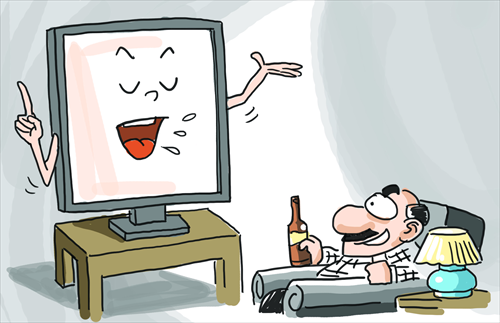HOME >> OP-ED
Soccer fans should cheer market freedom
By David Yang Source:Global Times Published: 2014-9-27 23:43:01

llustration: Liu Rui/GT
For any follower of the English Premier League (EPL) in China, the new soccer season hasn't been easy. Starting from the 2014-15 season, the EPL, arguably the most popular soccer franchise in China, is no longer free for Chinese viewers.
The change came as Super Sports, the broadcasting-rights holding company in the region, sold online broadcasting rights to LeTV and PPTV, two of the most promising media companies in Beijing and Shanghai, for $11 million each, a fee 10 to 15 times as high as in previous years.
Counting Super Sports themselves, the EPL now can only be watched through three online channels, and more than half the matches are pay-per-view only.
You may think I'm against the decision. But as someone who has just been through the hectic days of watching the 2014 World Cup on CCTV and its website, I actually applaud and cheer for it. Why? Because with a free market for broadcasting rights, you'd have competitions between broadcasters on- and off-line and eventually a better product for the sports consumers.
Earlier this month, Chinese Premier Li Keqiang presided over a meeting in the State Council, which specifically discussed about the burgeoning sports industry in the country.
According to media report, the decade-old stringent broadcasting rights regulations will be lifted, and we can expect a more competitive race in the sector in the coming years.
In 2000, China's top media regulator issued a regulation which stipulates that only CCTV, the State broadcaster, can negotiate and purchase broadcasting rights of major international sports competitions, such as the Olympics, the Asian Games and the World Cup. The best local TV stations can do is to discuss with the national broadcaster for a possible redistribution of rights. The regulation is so outdated that it didn't even mention online media platforms.
Chinese Internet portals and video sites produced their own World Cup shows, but none of them offered live match broadcasting. So there was no streaming of high-definition games.
Viewers had no choice, but to go get a TV and enjoy the staid commentaries. It's actually absurd if you put it in context that China now has almost twice as many Internet users as the US has, and over 700 million smartphone users.
The EPL is nothing like that. The online broadcasters have multiple options in video qualities, and feature the best commentators in the country. It even offers commentaries in English and by enthusiastic fans themselves.
Another goodwill policy change coming out of the State Council meeting is for sports events organizers. Companies no longer need to get approval from sports bureaus for hosting commercial and public sports events.
For decades, China's local sports bureaus charged mandatory fees from companies for holding any sports event, big or small.
If a sports bureau doesn't stamp the chop on the paperwork, an event is deemed to have violated the regulations, and the organizer can expect a series of inquiries from the local policy bureau, fire-protection bureau, and so on.
Besides government funding, the mandatory fees are the main income for most local sports bureaus, and the decision will no doubt hit them hard.
"For sports bureaus, this doesn't just mean a drop in the income and a few job cuts," Liu Xiaowu, director of the Guangdong Futsal Association, told me.
"In the future, there will only be associations that help coordinate all parties hosting an event," said Liu.
Sports like soccer and basketball are highly socialized in the West, but here they are controlled and managed by governmental "sports centers," which lack both the proficiency and efficiency that are needed.
"No wonder that China's national soccer team lost to Thailand and North Korea recently and we can expect them to go down further," Liu told me.
The Guangdong Futsal Super League that Liu oversees maybe the best example how sports can benefit from less government control.
Unlike most sports in China, it hasn't spent a penny of taxpayers' money and yet, in five years since its founding, the league produced 26 players for China's national futsal (a variant of five-a-side soccer) team, and the best team in the league twice ranked fourth in AFC Futsal Club Championship.
"I think we made the sports regulators lose face," Liu Gang, a boxing promoter in Yunnan who helped Xiong Chaozhong, a world-champion professional boxer, rise to the top suggested. "They spent a lot of money, sometimes to no avail, but we as professionals produced champions too and made money through commercial events."
China copied the sports model from the Soviet Union in the past, and produced hundreds of Olympics champions funded by the State coffers. But it's always fallen behind in sports that depend on popular enthusiasm and managerial talent, like soccer, rather than individual excellence. The new policy changes could break the dam on a new wave of China's vast sports and business potential.
The author is Football Partnership Director at the Mailman Group. editor@chinasportsreview.com
Posted in: Viewpoint